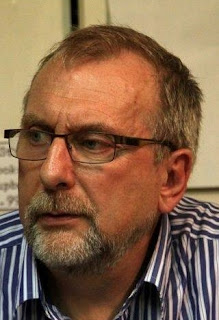Greg Freeman's latest poetry collection, The Fall of Singapore, marks the 80th anniversary of the Allied surrender at Singapore to numerically inferior Japanese forces, which led to thousands of deaths of prisoners of war and local workers forced to build the infamous Burma-Thailand ‘Death Railway’. The poet’s father was a railway survivor, and his words can be heard in this book.
About the book...
February 15 2022 marked the 80th anniversary of the fall of Singapore, the surrender of numerically superior Allied forces to a Japanese army - a moment that has gone down in history as Britain’s biggest military capitulation.
Woking poet
Greg Freeman’s father Ted Freeman was one of the huge number of Allied soldiers
taken prisoner. With many others, he was later forced to work on the infamous
Burma-Siam ‘Death Railway’. Many thousands did not survive its hardships and
brutality.
Greg’s father died in 1989, and since then he has been trying to find a way to tell his father’s story. This month he has published a pamphlet collection of poems, The Fall of Singapore, that includes a sequence about the railway. As he says, it has been a long journey and writes...
“Soon after
my father died I went to the Imperial War Museum and asked to see war veterans’
accounts of the Death Railway. I was brought a couple of shoeboxes full of individual
memoirs, maybe a few typed sheets, the odd published book. I spent several
sessions at the museum going through these, making notes, assembling a picture
of what it had been like.
My father
had given me some information. In the late 1970s and early 80s we would
sometimes talk late at night, and before I slept I would always transcribe what
he had said. His words are interspersed with poems in The Fall of Singapore.
Beginning
in the 1990s, I was always trying to find a way of telling his story. I tried
writing a novel – I had tried writing a few novels over the years – but that
didn’t work. Then I attempted to encapsulate the whole thing in a little story which
made the shortlist at a Guildford literary festival competition. In 2008 during
a brief stop in Thailand, we made a day trip – by train – to Kanchanaburi and
the bridge over the River Kwai. After I turned to poetry I wrote a sestina about
the Death Railway called ‘Learning By Heart’ which was commended in a Wilfred
Owen Association competition. In 2020, around the 75th anniversary of VJ Day, a
poet friend suggested I publish a sequence. I thought no more about it until
late last year when I realised the 80th anniversary of Singapore was fast
approaching. Could this finally be the moment?
It’s thanks
in great measure to Guildford publishers Dempsey & Windle, who have turned
it all around with remarkable sympathy and speed, that it has finally happened. Like
so many others, my father never expected to find himself in the jungle in
Thailand. A line in one of the poems says: “The call of the empire? He had no
dreams.”
Dad worked
in a succession of Southern railway ticket offices before the war. As it turned
out, he worked on the railway before, during, and after the war. I’m not sure that
he ever particularly appreciated the irony.
This
collection also includes other poems with wartime settings. Thus there is one
about the Islamic peace garden outside Woking – formerly a burial ground for
Muslim soldiers from both wars – called ‘A Foreign Wood’. But the heart of the
collection is the experience of those prisoners of war in Thailand. My book is
intended as a tribute to them all – to those who survived, and to those who
sacrificed their lives.” - Greg Freeman
ISBN 9781--913329-69-3
Copyright, Greg Freeman, 2022
Paperback, 210x148mm
50 pages
RRP £8.00
"...written with
reverence and candour and without a judgmental eye, which allows the
experiences of everyday civilians to shine clearly through the darkness of
war." - Antony Owen, Peace poet
* * *




No comments:
Post a Comment